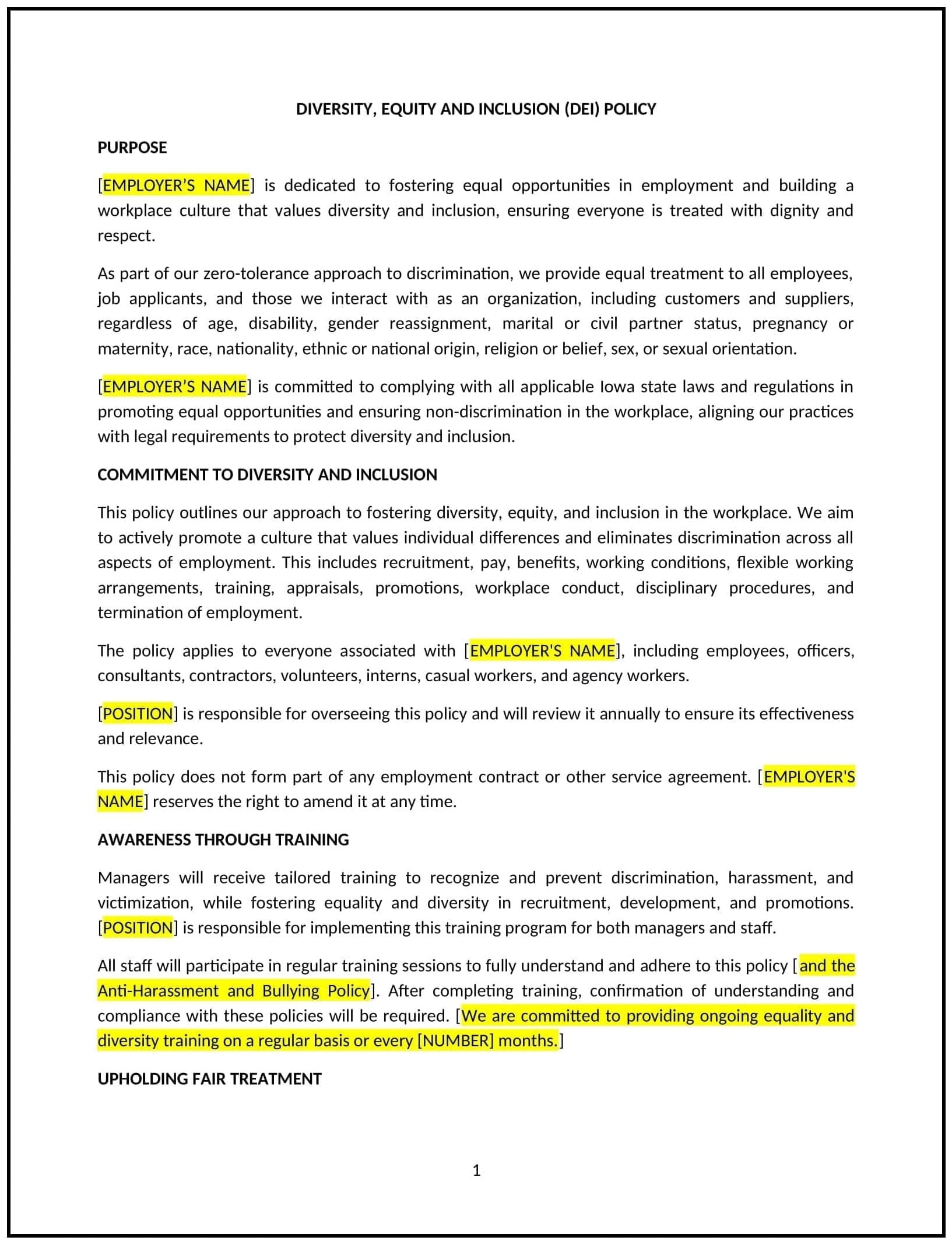Diversity, equity, and inclusion (DEI) policy (Iowa): Free template
Got contracts to review? While you're here for policies, let Cobrief make contract review effortless—start your free review now.

Customize this template for free
Diversity, equity, and inclusion (DEI) policy (Iowa)
A diversity, equity, and inclusion (DEI) policy helps Iowa businesses create a workplace culture that values differences, promotes fairness, and fosters an inclusive environment for all employees. A strong DEI framework benefits businesses by improving employee engagement, broadening perspectives, and strengthening workplace relationships.
This policy outlines the principles of DEI, expectations for leadership and employees, and strategies to promote equitable opportunities. It provides businesses with a structured approach to integrating DEI into hiring, professional development, and workplace interactions.
By implementing this policy, businesses in Iowa can cultivate a diverse workforce, enhance innovation, and create an environment where all employees feel respected and valued.
How to use this diversity, equity, and inclusion (DEI) policy (Iowa)
- Define DEI principles: Establish the core values of diversity, equity, and inclusion that guide workplace practices.
- Promote inclusive hiring practices: Encourage recruitment strategies that attract and retain diverse talent.
- Address workplace equity: Ensure all employees have access to growth opportunities, mentorship, and fair treatment.
- Establish respectful workplace expectations: Set guidelines for fostering inclusive interactions and preventing discrimination.
- Provide DEI training: Offer regular training sessions to educate employees on unconscious bias, inclusive leadership, and cultural awareness.
- Encourage diverse perspectives: Create forums for employees to share ideas and contribute to decision-making processes.
- Designate accountability measures: Assign responsibility to leadership or a DEI committee to oversee initiatives and track progress.
- Review and update: Regularly assess DEI programs and policies to reflect workplace needs and best practices.
Benefits of using this diversity, equity, and inclusion (DEI) policy (Iowa)
This policy offers several advantages for Iowa businesses:
- Improves employee engagement: Fosters a workplace where employees feel valued and respected.
- Expands talent acquisition: Attracts a diverse range of candidates with unique skills and experiences.
- Strengthens innovation: Encourages diverse perspectives that drive creative problem-solving.
- Promotes workplace equity: Ensures fair opportunities for career growth and development.
- Enhances company reputation: Demonstrates a commitment to inclusivity and equitable business practices.
- Builds a stronger team culture: Encourages collaboration across different backgrounds and experiences.
Tips for using this diversity, equity, and inclusion (DEI) policy (Iowa)
- Lead by example: Businesses should ensure leadership actively participates in DEI efforts and sets a positive tone.
- Provide ongoing education: Businesses should implement DEI training programs to reinforce inclusive behaviors.
- Set measurable DEI goals: Businesses should track progress through diversity metrics and employee feedback.
- Encourage open discussions: Businesses should create safe spaces for employees to share their experiences and perspectives.
- Recognize and address bias: Businesses should establish procedures for identifying and mitigating bias in decision-making.
- Integrate DEI into business strategy: Businesses should align DEI initiatives with company values and long-term goals.